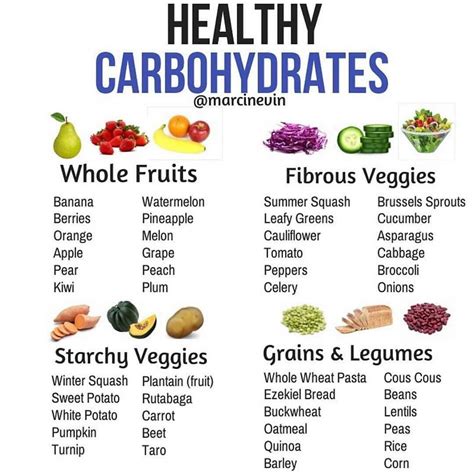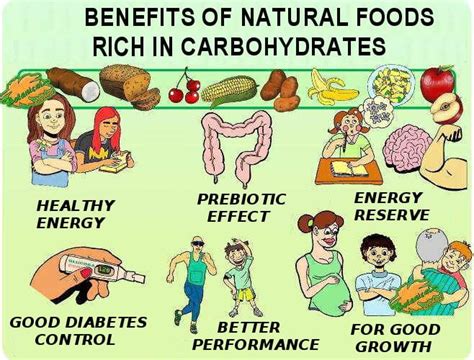Intro
Discover a comprehensive Carbohydrates Foods List, featuring whole grains, fruits, vegetables, and legumes, to help manage carb intake and boost nutrition with healthy complex carbs and fiber-rich options.
Carbohydrates are one of the most essential nutrients that our bodies need to function properly. They are the body's primary source of energy, and they come in various forms, including sugars, starches, and fibers. Carbohydrates are found in a wide range of foods, including grains, fruits, vegetables, and dairy products. In this article, we will delve into the world of carbohydrates, exploring their importance, types, and providing a comprehensive list of carbohydrate-rich foods.
The importance of carbohydrates cannot be overstated. They are the body's primary source of energy, and they play a crucial role in many bodily functions, including the functioning of the brain, nervous system, and muscles. Carbohydrates are also essential for the proper functioning of the digestive system, and they help to regulate blood sugar levels. Furthermore, carbohydrates are important for maintaining a healthy weight, as they provide the body with the energy it needs to function properly.
Carbohydrates come in two main types: simple and complex. Simple carbohydrates, also known as sugars, are quickly digested and absorbed by the body, providing a rapid source of energy. Examples of simple carbohydrates include fructose, glucose, and sucrose. Complex carbohydrates, on the other hand, are slower to digest and provide a more sustained release of energy. Examples of complex carbohydrates include starches and fibers. Complex carbohydrates are generally considered healthier than simple carbohydrates, as they are richer in nutrients and fiber.
Types of Carbohydrates

There are several types of carbohydrates, each with its own unique characteristics and functions. Some of the most common types of carbohydrates include:
- Monosaccharides: These are the simplest form of carbohydrates and include fructose, glucose, and galactose.
- Disaccharides: These are composed of two monosaccharides and include sucrose, lactose, and maltose.
- Polysaccharides: These are complex carbohydrates composed of many monosaccharides and include starches, fibers, and glycogen.
- Oligosaccharides: These are short chains of monosaccharides and include raffinose, stachyose, and verbascose.
Carbohydrate-Rich Foods

Carbohydrates are found in a wide range of foods, including:
- Grains: bread, pasta, rice, cereals, and quinoa
- Fruits: apples, bananas, berries, citrus fruits, and tropical fruits
- Vegetables: leafy greens, broccoli, carrots, sweet potatoes, and corn
- Dairy products: milk, cheese, yogurt, and ice cream
- Legumes: beans, lentils, peas, and peanuts
- Nuts and seeds: almonds, walnuts, chia seeds, and flax seeds
Grains
Grains are one of the richest sources of carbohydrates. They include: * Bread: white bread, whole wheat bread, rye bread, and sourdough bread * Pasta: spaghetti, linguine, fettuccine, and macaroni * Rice: white rice, brown rice, basmati rice, and jasmine rice * Cereals: oatmeal, cornflakes, rice krispies, and muesli * Quinoa: a protein-rich grain that is native to the Andean regionFruits
Fruits are a rich source of carbohydrates, particularly simple carbohydrates like fructose and glucose. Some of the richest sources of carbohydrates in fruits include: * Apples: one medium-sized apple contains 25 grams of carbohydrates * Bananas: one medium-sized banana contains 27 grams of carbohydrates * Berries: strawberries, blueberries, raspberries, and blackberries are all rich in carbohydrates * Citrus fruits: oranges, grapefruits, lemons, and limes are all good sources of carbohydrates * Tropical fruits: mangoes, pineapples, and papayas are all rich in carbohydratesBenefits of Carbohydrates

Carbohydrates have numerous benefits for the body. Some of the most significant benefits include:
- Providing energy: carbohydrates are the body's primary source of energy
- Supporting digestive health: carbohydrates help to regulate bowel movements and prevent constipation
- Supporting healthy blood sugar levels: carbohydrates help to regulate blood sugar levels and prevent spikes in insulin levels
- Supporting healthy weight: carbohydrates provide the body with the energy it needs to function properly, helping to maintain a healthy weight
- Supporting healthy brain function: carbohydrates are essential for the proper functioning of the brain and nervous system
Importance of Fiber
Fiber is a type of complex carbohydrate that is essential for maintaining a healthy digestive system. Some of the benefits of fiber include: * Regulating bowel movements: fiber helps to prevent constipation and promote regular bowel movements * Lowering cholesterol levels: fiber helps to lower cholesterol levels and reduce the risk of heart disease * Regulating blood sugar levels: fiber helps to regulate blood sugar levels and prevent spikes in insulin levels * Supporting healthy weight: fiber helps to promote feelings of fullness and support healthy weightCarbohydrate Deficiency

A carbohydrate deficiency can occur when the body does not get enough carbohydrates to function properly. Some of the symptoms of a carbohydrate deficiency include:
- Fatigue: a lack of energy and fatigue
- Weakness: muscle weakness and a lack of strength
- Dizziness: dizziness and lightheadedness
- Headaches: frequent headaches and migraines
- Constipation: constipation and irregular bowel movements
Causes of Carbohydrate Deficiency
A carbohydrate deficiency can be caused by a number of factors, including: * Poor diet: a diet that is low in carbohydrates can lead to a deficiency * Certain medical conditions: certain medical conditions, such as diabetes and celiac disease, can affect the body's ability to absorb carbohydrates * Medications: certain medications, such as diuretics and antibiotics, can affect the body's ability to absorb carbohydratesCarbohydrate Intake

The recommended daily intake of carbohydrates varies depending on factors such as age, sex, and activity level. Generally, the recommended daily intake of carbohydrates is:
- 45-65% of total daily calories: this is the recommended daily intake of carbohydrates for adults
- 55-65% of total daily calories: this is the recommended daily intake of carbohydrates for athletes and individuals who are physically active
Carbohydrate Loading
Carbohydrate loading is a technique that involves consuming a high amount of carbohydrates in the days leading up to a athletic event. This can help to maximize energy stores and improve performance. Some of the benefits of carbohydrate loading include: * Improved endurance: carbohydrate loading can help to improve endurance and reduce fatigue * Improved performance: carbohydrate loading can help to improve performance and increase speed and strength * Reduced risk of injury: carbohydrate loading can help to reduce the risk of injury and improve recoveryWhat are the benefits of carbohydrates?
+Carbohydrates provide energy, support digestive health, and help to regulate blood sugar levels. They also support healthy weight, healthy brain function, and healthy heart function.
What are the different types of carbohydrates?
+There are several types of carbohydrates, including monosaccharides, disaccharides, polysaccharides, and oligosaccharides. Each type of carbohydrate has its own unique characteristics and functions.
What is the recommended daily intake of carbohydrates?
+The recommended daily intake of carbohydrates varies depending on factors such as age, sex, and activity level. Generally, the recommended daily intake of carbohydrates is 45-65% of total daily calories.
What are the symptoms of a carbohydrate deficiency?
+The symptoms of a carbohydrate deficiency include fatigue, weakness, dizziness, headaches, and constipation. A carbohydrate deficiency can be caused by a number of factors, including a poor diet and certain medical conditions.
What is carbohydrate loading?
+Carbohydrate loading is a technique that involves consuming a high amount of carbohydrates in the days leading up to a athletic event. This can help to maximize energy stores and improve performance.
In conclusion, carbohydrates are an essential nutrient that plays a critical role in many bodily functions. They provide energy, support digestive health, and help to regulate blood sugar levels. A carbohydrate deficiency can occur when the body does not get enough carbohydrates to function properly, and can be caused by a number of factors, including a poor diet and certain medical conditions. The recommended daily intake of carbohydrates varies depending on factors such as age, sex, and activity level, and carbohydrate loading can be an effective technique for maximizing energy stores and improving performance. We hope this article has provided you with a comprehensive understanding of carbohydrates and their importance in maintaining a healthy body. If you have any further questions or comments, please do not hesitate to reach out. Share this article with your friends and family to help them understand the importance of carbohydrates in their diet.
